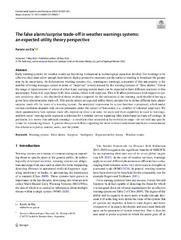Mostrar el registro sencillo del ítem
The false alarm/surprise trade‑of in weather warnings systems: an expected utility theory perspective
| dc.contributor.author | de Elía, Ramón | |
| dc.date.accessioned | 2022-08-10T15:29:35Z | |
| dc.date.available | 2022-08-10T15:29:35Z | |
| dc.date.issued | 2022-05 | |
| dc.identifier.citation | de Elía, R. The false alarm/surprise trade-off in weather warnings systems: an expected utility theory perspective. Environ Syst Decis (2022). https://doi.org/10.1007/s10669-022-09863-1 | es |
| dc.identifier.issn | 2194-5411 | |
| dc.identifier.uri | http://hdl.handle.net/20.500.12160/1994 | |
| dc.description | Servicio Meteorológico Nacional. Dirección Nacional de Ciencia e Innovación en Productos y Servicios. | es |
| dc.description.abstract | Early warning systems for weather events are becoming widespread as technological capacities develop. For warnings to be efective, they must allow enough lead time to deploy protective measures yet the earlier a warning is broadcast the greater may be its uncertainty. In dichotomous warning systems (i.e., warning-no warning), a measure of this uncertainty is the number of wrong messages issued in terms of “surprises” (events missed by the warning system) or “false alarms.” Given the range of repercussions of errors of either kind, warning system users can be expected to have diferent reactions to this uncertainty. Some will cope better with false alarms, others with surprises. This will afect preferences with respect to system sensitivity; that is, the threshold of threat evidence required for the realization of the warning, each threshold having a given false alarm/surprise trade-of. This article adopts an expected utility theory perspective to defne diferent false alarm/ surprise trade-ofs for users of a warning system. An analytical expression for a cost function is proposed, which under certain conditions depends only on one parameter under the control of forecasters (i.e., number of tolerated surprises). We show quantitatively how optimal trade-ofs depend on what is at stake for users and their capability to react to warnings, and how users’ varying needs represent a dilemma for a weather service regarding false alarm/surprise trade-of settings. In particular, it is shown that unbiased warnings—a condition often rewarded at the verifcation stage—do not hold any specifc virtue for minimizing losses. A general discussion follows regarding the need to better understand and better communicate this dilemma to policy makers, users, and the public. | es |
| dc.language.iso | eng | es |
| dc.publisher | Springer | es |
| dc.rights | info:eu-repo/semantics/openAccess | es |
| dc.subject | WARNING SYSTEM | es |
| dc.subject | FALSE ALARM | es |
| dc.subject | SURPRISE | es |
| dc.subject | AMBIGUITY | es |
| dc.subject | EXPECTED UTILITY THEORY | es |
| dc.subject | WEATHER EVENTS | es |
| dc.title | The false alarm/surprise trade‑of in weather warnings systems: an expected utility theory perspective | es |
| dc.type | Artículo | es |
| dc.rights.license | NO POSEE LICENCIA CC | es |
